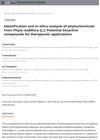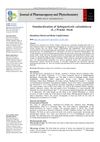1 citations,
January 2023 in “International journal of medical science and clinical research studies” Treating stubborn hair loss involves both medical and emotional support options.
2 citations,
November 1999 in “Journal of Cutaneous Medicine and Surgery” December 2021 in “Faculty Opinions – Post-Publication Peer Review of the Biomedical Literature”  36 citations,
September 2019 in “Journal of Herbal Medicine”
36 citations,
September 2019 in “Journal of Herbal Medicine” Herbal nano-formulations show potential for effective skin delivery but need more research.
17 citations,
January 2014 in “The American journal of Chinese medicine” Angelica sinensis may help regrow hair by blocking certain cell death signals.
 November 2023 in “Journal of Cosmetic Dermatology”
November 2023 in “Journal of Cosmetic Dermatology” Oral minoxidil is more convenient but topical minoxidil improves hair density better.
 1 citations,
April 2023 in “Frontiers in Immunology”
1 citations,
April 2023 in “Frontiers in Immunology” New treatments for hair loss from alopecia areata may include targeting immune cells, using stem cells, balancing gut bacteria, applying fatty acids, and using JAK inhibitors.
 March 2024 in “Dermatology and therapy (Internet)”
March 2024 in “Dermatology and therapy (Internet)” Genetic factors could lead to personalized treatments for hair loss.
 16 citations,
January 2007 in “Actas dermo-sifiliográficas/Actas dermo-sifiliográficas”
16 citations,
January 2007 in “Actas dermo-sifiliográficas/Actas dermo-sifiliográficas” The document concludes that there are no reliable treatments for frontal fibrosing alopecia, with only temporary benefits from current options.
 2 citations,
January 2023 in “Journal of Education, Health and Sport”
2 citations,
January 2023 in “Journal of Education, Health and Sport” Cognitive-behavioral therapy with habit reversal training is the most effective treatment for trichotillomania.
 December 2024 in “Plant Science Today”
December 2024 in “Plant Science Today” Phyla nodiflora contains compounds that may help treat diabetes, alopecia, cancer, and anti-diuresis.
 September 2024 in “South Eastern European Journal of Public Health”
September 2024 in “South Eastern European Journal of Public Health” Treatment improved PCOS symptoms and reduced BMI and certain immune factors.
12 citations,
January 2014 in “Journal of international medical research” Pemetrexed is as effective as docetaxel but has fewer side effects for treating nonsmall-cell lung cancer after EGFR-TKI therapy failure.
 11 citations,
March 2018 in “Anais Brasileiros de Dermatologia”
11 citations,
March 2018 in “Anais Brasileiros de Dermatologia” Betamethasone can effectively treat alopecia areata.
 3 citations,
January 2023 in “PloS one”
3 citations,
January 2023 in “PloS one” Implanting hair-follicle stem cells in mice brains helped repair brain bleeding and reduced brain inflammation.
 1 citations,
January 2023 in “Przegląd Dermatologiczny”
1 citations,
January 2023 in “Przegląd Dermatologiczny” The Polish Society of Dermatology recommends treatments for alopecia areata that vary by severity, including topical and systemic medications, with long-term maintenance important for management.
 1 citations,
January 2014 in “The journal of advances in parasitology”
1 citations,
January 2014 in “The journal of advances in parasitology” Effective treatment with antiparasitic, antibacterial, anti-inflammatory, and antiallergic medications can lead to recovery in dogs with complicated demodicosis.
June 2011 in “Dermatology Times” PRP therapy is a simple and safe option for hair loss, but its effectiveness is not clearly stated.
 50 citations,
July 1996 in “Fertility and Sterility”
50 citations,
July 1996 in “Fertility and Sterility” Finasteride effectively treats hirsutism in women, but more research needed for long-term results.
January 2012 in “Surgery”  1 citations,
November 2017 in “Dermatologic therapy”
1 citations,
November 2017 in “Dermatologic therapy” JAK inhibitors show promise as a future treatment for hair loss.
October 2021 in “Case Reports in Dermatology” Patients and doctors often differ in assessing hair loss severity, so treatment should be personalized.
125 citations,
February 2007 in “Journal of the American Academy of Dermatology” Combining eflornithine cream with laser treatment removes facial hair better than laser alone.
 March 2018 in “Trends in Immunotherapy”
March 2018 in “Trends in Immunotherapy” Combining triamcinolone acetonide with immunotherapy can help regrow hair in some alopecia totalis patients.
 August 2023 in “Stem Cell Research & Therapy”
August 2023 in “Stem Cell Research & Therapy” A substance called Cell-free fat extract can effectively treat common hair loss by increasing hair growth and density.
December 2024 in “Jurnal Ilmiah Farmasi (Scientific Journal of Pharmacy)” Nanotechnology could improve lavender oil's effectiveness, but more research is needed.
 May 2023 in “Journal of pharmacognosy and phytochemistry”
May 2023 in “Journal of pharmacognosy and phytochemistry” The study established quality standards for Sphagneticola calendulacea stem and suggested it may have therapeutic benefits.
November 2022 in “Molecular Pharmaceutics” cp-asiAR may effectively treat androgenetic alopecia by promoting hair growth and reducing androgen receptor activity.
88 citations,
July 2001 in “British journal of dermatology/British journal of dermatology, Supplement” The method effectively measures lipid changes and drug effects on skin follicles.
















